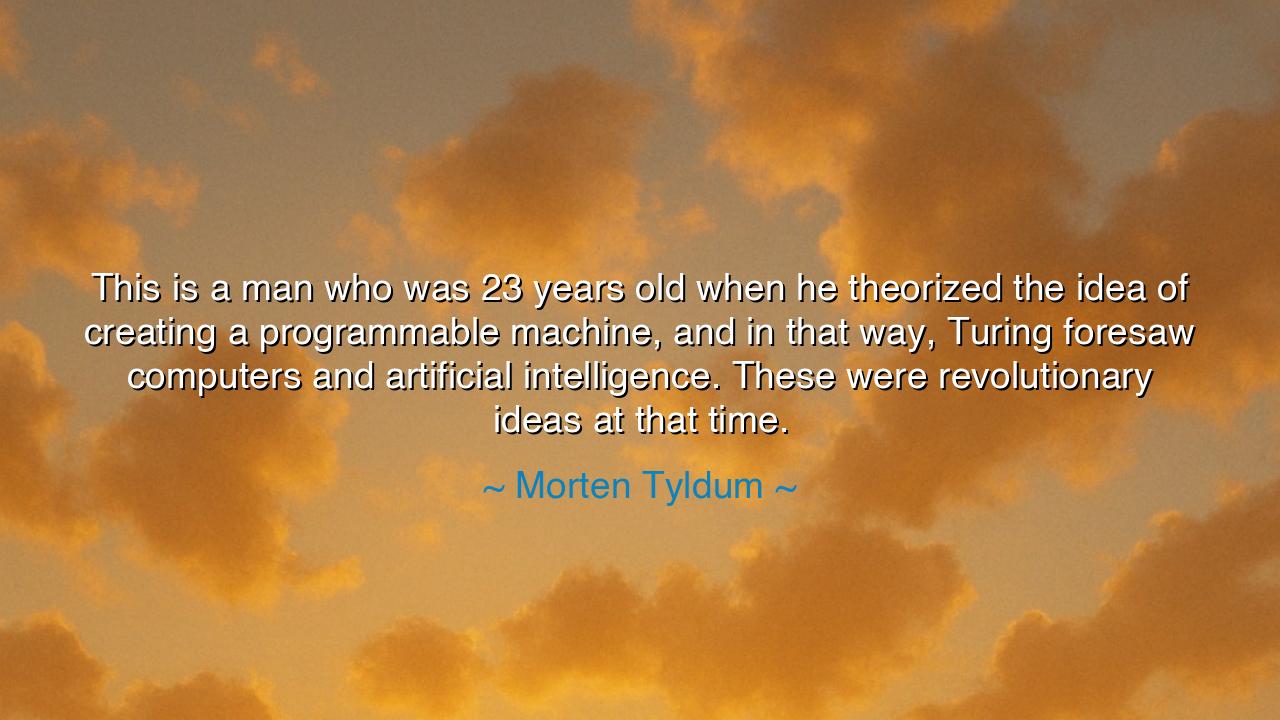
This is a man who was 23 years old when he theorized the idea of
This is a man who was 23 years old when he theorized the idea of creating a programmable machine, and in that way, Turing foresaw computers and artificial intelligence. These were revolutionary ideas at that time.






The filmmaker Morten Tyldum, in reflecting on one of history’s greatest minds, once said: “This is a man who was 23 years old when he theorized the idea of creating a programmable machine, and in that way, Turing foresaw computers and artificial intelligence. These were revolutionary ideas at that time.” In these words, Tyldum speaks not only of Alan Turing, but of the eternal spirit of genius—the power of a single mind to see beyond the horizon of its age. He reminds us that true vision is not born in comfort or conformity, but in courage—the courage to imagine a world that does not yet exist, and to believe in that vision even when others cannot.
Alan Turing, that quiet and brilliant mathematician, was only twenty-three when he wrote his immortal paper “On Computable Numbers.” In it, he described what he called the Turing Machine—a theoretical device that could, through simple instructions, perform any calculation imaginable. To the world of 1936, still defined by gears, levers, and the limits of human computation, this was no less than prophecy. He saw, before anyone else, that machines could think—that one day they might not only follow human commands but mirror the workings of the human mind itself. This was the birth of what we now call the computer and the distant seed of artificial intelligence. Tyldum, in awe of this feat, speaks of Turing as the ancients might have spoken of Prometheus—the bringer of fire, the one who gifted humanity the spark of new creation.
At a time when the word “computer” still meant a human being—a person who calculated numbers by hand—Turing dared to envision a future in which thought itself could be replicated, instructed, and extended by the machine. His vision was not mechanical; it was philosophical. He did not merely design a device, but questioned the very nature of intelligence. Could reason be reduced to logic? Could emotion be imitated by process? Could the human mind, in its mysterious beauty, be decoded and reborn in metal? These questions, posed by a man of twenty-three, were not just mathematical—they were existential. They echoed through the centuries, changing forever how humankind would define itself.
And yet, like so many visionaries, Turing lived in an age unready for his brilliance. His ideas were called impossible; his nature, condemned. During the war, he built the machine that would break the Enigma code, shortening the conflict and saving millions of lives. But though he gave the world the key to victory, the world repaid him with cruelty. For his love—his humanity—he was persecuted, shamed, and destroyed. Here lies the tragedy that the ancients knew well: that those who see furthest are often those who suffer most. The philosopher Socrates, too, was condemned for his insight; Galileo was imprisoned for his truth. The world often fears what it does not yet understand.
Tyldum’s words, then, are not only admiration—they are reverence. He reminds us that to foresee the future is to bear its burden. Turing’s vision of programmable machines was not a feat of intellect alone, but of imagination and endurance. He lived as an exile in his own time, yet the world he imagined became our own. Every time we touch a screen, ask a question of a computer, or speak to an artificial mind, we walk in the shadow of his thought. What was once unthinkable has become indispensable. The revolution he began at twenty-three continues still, unfolding in every algorithm and artificial neuron.
From this story emerges a lesson for all who seek to create, to innovate, or to dream: greatness is not born in ease, nor is it nurtured by the approval of the crowd. It is the flame that burns quietly in the heart of the visionary, who dares to look where others cannot. To imagine the impossible is to invite ridicule, but also to beckon the dawn. Turing’s life teaches that the measure of genius is not the praise it earns, but the worlds it awakens. So, when your ideas are doubted, remember this young man who saw thinking machines in an age of typewriters—and whose thoughts became the foundation of a new civilization.
Thus, Morten Tyldum’s reflection stands as a hymn to human potential. It calls us to honor those who see beyond their age, and to recognize in their struggle the cost of all progress. It reminds us that revolutionary ideas are not born in comfort but in courage—and that every act of creation is also an act of defiance. Let us, then, be like Turing: to think boldly, to question deeply, and to build with purpose. For one day, the impossible vision of today may become the ordinary reality of tomorrow. And when it does, the world will remember—not the doubt, but the dream that began it all.






AAdministratorAdministrator
Welcome, honored guests. Please leave a comment, we will respond soon